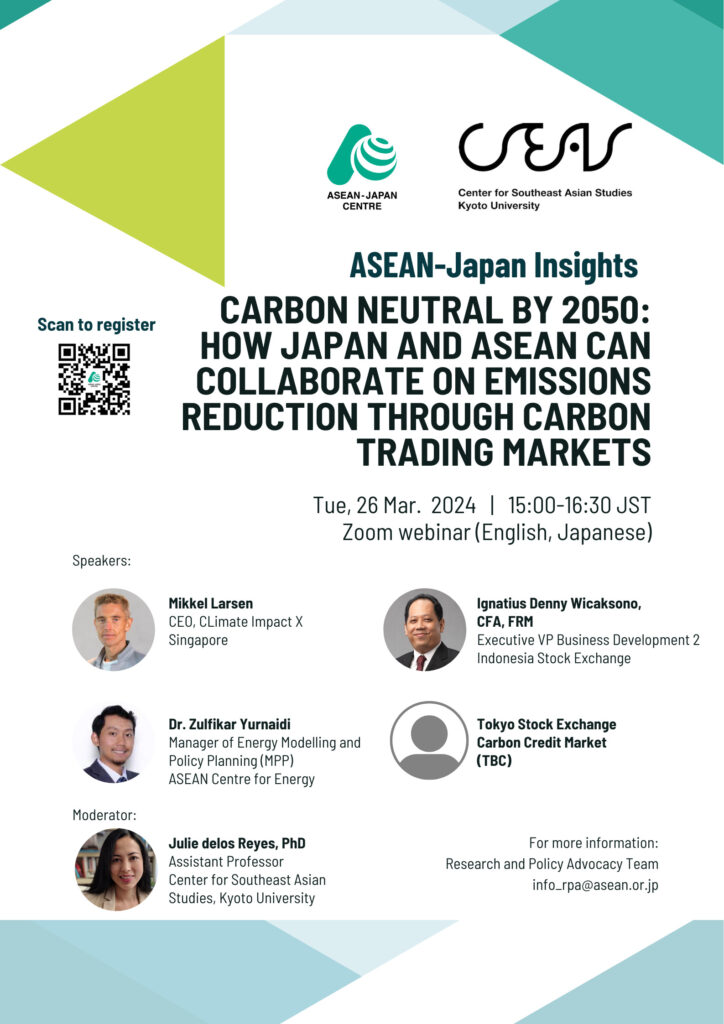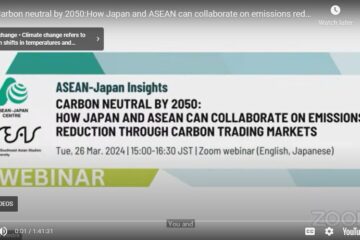The ASEAN-Japan Centre and the Center for Southeast Asian Studies, (CSEAS) Kyoto University, invite everyone to the webinar, “Carbon neutral by 2050: How Japan and ASEAN can collaborate on emissions reduction through carbon trading markets“.
Tuesday, 26 March 2024
15:00-16:30 JST | 14:00-15:30 SGT | 13:00-14:30 ICT
Zoom webinar (English with simultaneous Japanese translation)
About the ASEAN-Japan Insights Series
The Series aims to be a relevant and leading information sharing platform in the region on ASEAN-Japan matters. It will be a hybrid, bilingual (English and Japanese) webinar series that will regularly feature hot topics in ASEAN and Japan and facilitate information sharing and knowledge sharing among industry, academia, governments, and enterprises within the region. Each webinar will be co-organized with a partner institution in ASEAN to foster cross-collaboration and co-creation between ASEAN and Japan stakeholders.
Introduction
ASEAN has set its ambitious target to be carbon neutral by 2050. According to the ASEAN Secretariat, the region stands to benefit from a GDP value-add of around US$3-5 million by 2050, with Cambodia, Lao PDR, Myanmar and Viet Nam seen to have the greatest uplift of 9-12% of GDP, and middle-income countries such as Indonesia, Malaysia, Philippines and Thailand can reach 4-7% GDP increase. The ASEAN Strategy for Carbon Neutrality sets out 8 strategies to accomplish this goal focusing on the establishment of regional frameworks to integrate green value chains, harmonize standards on GHG reporting and carbon credits, connect and align green infrastructure with market requirements, development of interoperable carbon markets, deploying green capital, facilitating mobility of green talent, and sharing of green best practices.
The webinar , organized by the ASEAN-Japan Centre and the Center for Southeast Asian Studies, (CSEAS) Kyoto University, aim to initiate a productive discussion on advancing energy cooperation and accelerating energy transition in support of the Asia Zero Emission Community (AZEC) as highlighted in the recent Joint Vision Statement on ASEAN-Japan Friendship and Cooperation in December 2023. With the increasing global emphasis on sustainable development and climate change mitigation, carbon trading has emerged as a critical mechanism for reducing greenhouse gas emissions. The webinar will feature presentations from, and a panel discussion involving experts in the field and will discuss the challenges and opportunities of carbon trading between the ASEAN countries and Japan.
Zoom Registration link:
https://us06web.zoom.us/webinar/register/WN_jxwbBkCcR4WqJ7tw-Yy5mA
Programme as of 6 March 2024
| 15:00-15:05 | Introduction to the ASEAN-Japan Insights Katrina NAVALLO, PhD Programme Manager, Research and Policy Advocacy Team, ASEAN-Japan Centre |
| 15:03-15:05 | Welcome and Opening Remarks HIRABAYASHI Kunihiko, MD, PhD Secretary General, ASEAN-Japan Centre |
| 15:06-15:10 | Introduction of the speakers Katrina NAVALLO, PhD Programme Manager, Research and Policy Advocacy Team, ASEAN-Japan Centre |
| 15:11-15:35 | Carbon Neutral by 2050: How Japan and ASEAN can collaborate on emissions reduction through carbon trading markets Presentations (5 mins each speaker): 1. Climate Impact X (CIX), Singapore ・Mikkel Larsen, Chief Executive Officer 2. IDX Carbon Exchange Indonesia ・Ignatius Denny Wicaksono, CFA, FRM, Executive Vice President of Business Development 2, Indonesia Stock Exchange 3. ASEAN Centre for Energy ・Dr. Zulfikar Yurnaidi, Manager of Energy Modelling and Policy Planning (MPP) , ASEAN Centre for Energy 4. Tokyo Stock Exchange, Carbon Credit Market Office (TBC) |
| 15:36-16:25 | Panel Discussion and Open Forum 1. Moderator: ・Julie de los Reyes, PhD, Assistant Professor, Center for Southeast Asian Studies, Kyoto University 2. Climate Impact X (CIX), Singapore ・Mikkel Larsen, Chief Executive Officer 3. IDX Carbon Exchange Indonesia ・Ignatius Denny Wicaksono, CFA, FRM, Executive Vice President of Business Development 2, Indonesia Stock Exchange 4. ASEAN Centre for Energy ・Dr. Zulfikar Yurnaidi, Manager of Energy Modelling and Policy Planning (MPP), ASEAN Centre for Energy 5. Tokyo Stock Exchange, Carbon Credit Market Office (TBC) |
| 16:25-16:30 | Wrap up and end |
Discussion content and overview
1. Overview of Carbon Trading in Japan and ASEAN countries: An introduction to the concept of carbon trading, its significance in the context of climate change, and its role in achieving sustainability goals.
2. Carbon Markets in and between ASEAN and Japan: Examination of the current state of the carbon market between ASEAN and Japan, including key players, market size, and trends.
3. Challenges in Carbon Trading: Discussion on the challenges faced in carbon trading, such as carbon pricing, emissions trading system (ETS), carbon taxes, and carbon crediting mechanism.
4. Opportunities for Growth: Exploration of the potential opportunities in the carbon market, including technological advancements, policy incentives, and international cooperation.
5. Case Studies: Presentation of successful carbon trading markets and lessons learned from both ASEAN and Japan.
6. Future Prospects of Carbon Trading between ASEAN and Japan: Consolidation of the future prospects of carbon trading between ASEAN and Japan, considering global trends and regional dynamics.
Panel Discussion Questions
For Climate Impact X (CIX), Singapore:
1. Can you share your experience in developing the global carbon exchange and marketplace, Climate Impact X (CIX)?
2. How has the carbon tax legislation in Singapore influenced the carbon trading market?
For IDX Carbon Indonesia:
1. Can you discuss Indonesia’s new framework towards a regulated carbon market?
2. How has REDD+ influenced carbon trading practices in Indonesia?
3. What changes in policies do you anticipate will be enacted by the new administration that could affect the carbon market?
4. Since its inception, how dynamic has the carbon market been? What steps are being taken to guarantee an adequate balance of demand for and supply of carbon credits within the exchange?
For ASEAN Centre for Energy:
- What are the current regional initiatives to promote carbon trading market among ASEAN countries?
- What are the challenges and opportunities in ASEAN countries currently face in establishing capacities to trade carbon credits?
For Tokyo Stock Exchange:
1. Can you discuss the current efforts of the Japanese government in starting a demonstrative carbon credit market in Japan?
2. How do you see the future of carbon trading in Japan, especially in relation to ASEAN countries?
For all speakers:
1. What are the key consideration in setting the optimal price for carbon credits?
2. How can we ensure that the price is not so low that it becomes more economical for companies to buy these credits rather than take steps to reduce their emissions?



